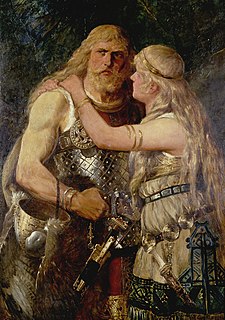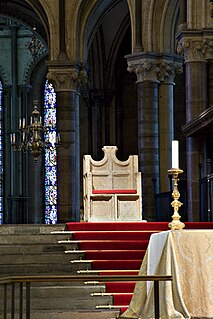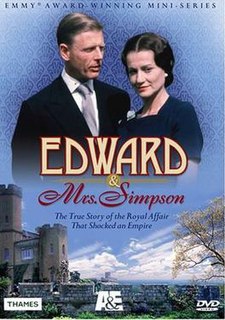
Marriage, also called matrimony or wedlock, is a culturally and often legally recognized union between people called spouses. It establishes rights and obligations between them, as well as between them and their children, and between them and their in-laws. It is considered a cultural universal, but the definition of marriage varies between cultures and religions, and over time. Typically, it is an institution in which interpersonal relationships, usually sexual, are acknowledged or sanctioned. In some cultures, marriage is recommended or considered to be compulsory before pursuing any sexual activity. A marriage ceremony is called a wedding.

The House of Tudor was a royal house of Welsh-French origin that held the English throne, descended from the Tudors of Penmynydd and Catherine of France. Tudor monarchs ruled the Kingdom of England and its realms, including their ancestral Wales and the Lordship of Ireland from 1485 until 1603, with five monarchs in that period: Henry VII, Henry VIII, Edward VI, Mary I and Elizabeth I. There is also a sixth Tudor monarch, Jane Grey, who disputedly reigned for nine days, in between Edward VI and Mary I. The Tudors succeeded the House of Plantagenet as rulers of the Kingdom of England, and were succeeded by the House of Stuart. The first Tudor monarch, Henry VII of England, descended through his mother from a legitimised branch of the English royal House of Lancaster, a cadet house of the Plantagenets. The Tudor family rose to power in the wake of the Wars of the Roses (1455–1487), which left the Tudor-aligned House of Lancaster extinct in the male line.

Princess Margaret, Countess of Snowdon, was the younger daughter of King George VI and Queen Elizabeth and the only sibling of Queen Elizabeth II.

Wallis, Duchess of Windsor, known as Wallis Simpson, was an American socialite and wife of the Duke of Windsor, the former King-Emperor Edward VIII. Their intention to marry and her status as a divorcée caused a constitutional crisis that led to Edward's abdication.

In 1936, a constitutional crisis in the British Empire arose when King-Emperor Edward VIII proposed to marry Wallis Simpson, an American socialite who was divorced from her first husband and was pursuing the divorce of her second.

A Study in Scarlet is a 1887 detective novel by British writer Arthur Conan Doyle. The story marks the first appearance of Sherlock Holmes and Dr. Watson, who would become the most famous detective duo in literature. The book's title derives from a speech given by Holmes, a consulting detective, to his friend and chronicler Watson on the nature of his work, in which he describes the story's murder investigation as his "study in scarlet": "There's the scarlet thread of murder running through the colourless skein of life, and our duty is to unravel it, and isolate it, and expose every inch of it."

Charles Richard John Spencer-Churchill, 9th Duke of Marlborough,, styled Earl of Sunderland until 1883 and Marquess of Blandford between 1883 and 1892, was a British soldier and Conservative politician, and a close friend of his first cousin Winston Churchill. He was often known as "Sunny" Marlborough after his courtesy title of Earl of Sunderland.

The Church of England traces its history back to 597. That year, a group of missionaries sent by the pope and led by Augustine of Canterbury began the Christianisation of the Anglo-Saxons. Augustine became the first Archbishop of Canterbury. Throughout the Middle Ages, the English Church was a part of the Catholic Church led by the pope in Rome. Over the years, the church won many legal privileges and amassed vast wealth and property. This was often a point of contention between Kings of England and the church.

John Francis Stanley Russell, 2nd Earl Russell, known as Frank Russell, was a British nobleman, barrister and politician, the elder brother of the philosopher Bertrand Russell, and the grandson of John Russell, 1st Earl Russell, who was twice prime minister of Britain. The elder son of Viscount and Viscountess Amberley, Russell became well-known for his marital woes, and was convicted of bigamy before the House of Lords in 1901, the last peer to be convicted of an offence in a trial by the Lords before that privilege of peerage was abolished in 1948.

Edna Clara Best was a British actress.

In common parlance, the wives of Henry VIII were the six queens consort wedded to King Henry VIII of England between 1509 and his death in 1547. In legal terms, Henry had only three wives, because three of his marriages were annulled by the Church of England. However, he was never granted an annulment by the Pope, as he desired, for Catherine of Aragon, his first wife. Annulments declare that a true marriage never took place, unlike a divorce, in which a married couple end their union. Along with his six wives, Henry took several mistresses.

The wedding of Prince Charles and Camilla Parker Bowles took place in a civil ceremony at Windsor Guildhall, on 9 April 2005. The ceremony, conducted in the presence of the couple's families, was followed by a Church of England Service of Prayer and Dedication at St George's Chapel. The groom's parents, Queen Elizabeth II and Prince Philip, Duke of Edinburgh, did not attend the civil wedding ceremony, but were present at the Service of Prayer and Dedication and held a reception for the couple in Windsor Castle afterwards.

Edward & Mrs. Simpson is a seven-part British television series that dramatises the events leading to the 1936 abdication of King Edward VIII, who gave up his throne to marry the twice-divorced American Wallis Simpson.

Marriage is available in England and Wales to both opposite-sex and same-sex couples and is legally recognised in the forms of both civil and religious marriage. Marriage laws have historically evolved separately from marriage laws in other jurisdictions in the United Kingdom. There is a distinction between religious marriages, conducted by an authorised religious celebrant and civil marriages conducted by a state registrar. The legal minimum age to enter into a marriage in England and Wales is eighteen years. Certain relatives are not allowed to marry. For foreign nationals, there are also residency conditions that have to be met before people can be married. Same-sex marriage was introduced under the Marriage Act in March 2014.

Marriage law refers to the legal requirements that determine the validity of a marriage, and which vary considerably among countries. See also Marriage Act.
Milton's divorce tracts refer to the four interlinked polemical pamphlets—The Doctrine and Discipline of Divorce, The Judgment of Martin Bucer, Tetrachordon, and Colasterion—written by John Milton from 1643–1645. They argue for the legitimacy of divorce on grounds of spousal incompatibility. Arguing for divorce at all, let alone a version of no-fault divorce, was extremely controversial and religious figures sought to ban his tracts. Although the tracts were met with nothing but hostility and he later rued publishing them in English at all, they are important for analysing the relationship between Adam and Eve in his epic Paradise Lost. Spanning three years characterised by turbulent changes in the English printing business, they also provide an important context for the publication of Areopagitica, Milton's most famous work of prose.

Marriage in Israel can be performed only under the auspices of the religious community to which couples belong, and inter-faith marriages performed within the country are not legally recognized. Matrimonial law is based on the millet or confessional community system which had been employed in the Ottoman Empire, including what is now Israel, was not modified during the British Mandate of the region, and remains in force in the State of Israel.

Holy Deadlock is a 1934 satirical novel by the English author A. P. Herbert, which aimed to highlight the perceived inadequacies and absurdities of contemporary divorce law. The book took a particularly lenient view of the need for divorces, which it characterised as "a relief from misfortune, not a crime", and demonstrated how the current system created an environment which encouraged the participants to commit perjury and adultery. The book was a major element in the popular debate about the liberalisation of divorce law in the mid-1930s, and helped pave the way for the 1937 statutory reforms.
The Matrimonial Causes Act 1937 is a law on divorce in the United Kingdom. It extended the grounds for divorce, which until then only included adultery, to include unlawful desertion for three years or more, cruelty, and incurable insanity, incest or sodomy.

Frances "Fanny" Nelson, Viscountess Nelson, née Frances Herbert Woolward, is best known as the wife of Horatio Nelson, the British naval officer who won several victories over the French during the French Revolutionary and Napoleonic Wars.


















